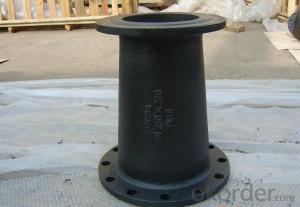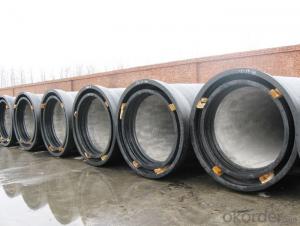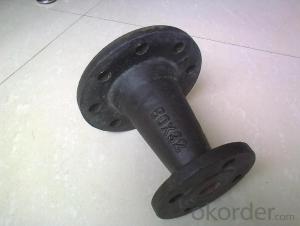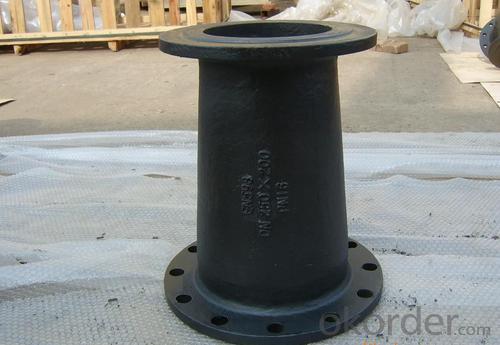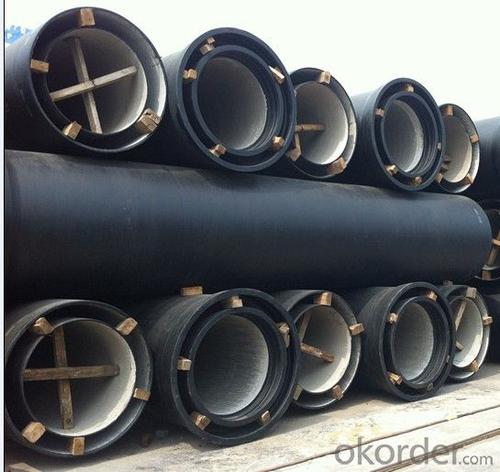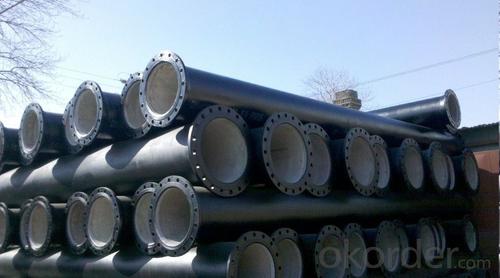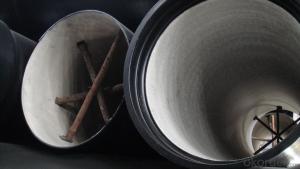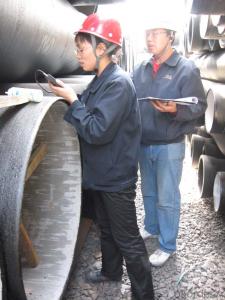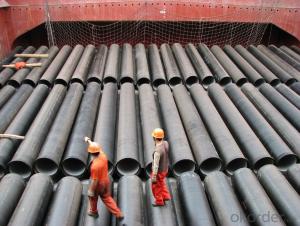Ductile Iron Pipe On Sale Made In China DN200
- Loading Port:
- Tianjin
- Payment Terms:
- TT or LC
- Min Order Qty:
- 1000 m
- Supply Capability:
- 10000 m/month
OKorder Service Pledge
OKorder Financial Service
You Might Also Like
1.Packaging & Delivery
Packaging Detail: | DN80-300 bundled with steel belt ( the bundle size see the product detail part) DN400-1200 are in bulk |
Delivery Detail: | at least 5days for MOQ |
2.Specifications
Ductile iron pipe comply with ISO2531/EN545
1)We are factory
2)Best quality
3)Competive price
4)On time delivery
3.Features:
Facilitating high resistance to loadings, pressure and vacuum with high tensile strength,
Enabling high resistance to corrosion,
Not requiring cathodic protection,
Less operating cost since cast pipes have larger nominal diameter than polyethylene pipes.
Being the best pipe in case of an earthquake, with its ability of resilience and resistance to impacts without deformation,
Long product life, exceeding 50 years,
Preserving the quality of water with healthy interior coating.
4.Applied Standards:
General Design | ISO 2531 |
Internal Lining | ISO 4179 |
External Coating | ISO 8179 |
Polyethylene Coating (Optional) | ISO 8180 |
5.Joint Types:
Push-on Type | TYT Type |
Standard Type |
6. Diameters:
Pipes | Ø80 – Ø1200 mm (L = 6m, and 5.7m) |
Fittings | Ø80 - Ø2200 mm |
7. Wall Thickness:
Pipes | C and K classes |
Fittings | Class K10 - K12 |
8.Test Pressures:
Pipes | for Ø80 - Ø300 mm | 50 bar / 40 bar |
for Ø350 - Ø600 mm | 40 bar / 30 bar | |
for Ø700 - Ø1000 mm | 32 bar / 25 bar | |
for Ø1100 - Ø2600 mm | 25 bar |
Fittings | for Ø40 - Ø300 mm | 25 bar (*) |
for Ø350 - Ø600 mm | 16 bar | |
for Ø700 - Ø2600 mm | 10 bar | |
(*16 bar for fittings with PN10 flanges) | ||
9.Materials:
Pipe | Ductile iron casting, minimum 420 MPa tensile strength |
Internal Lining | Concrete Lining, ISO 4179 |
Socket Internal 10.Lining | 200 micron epoxy coating |
External Coating | 70 micron bitumen coating on 130 gr/m2 zinc coating, ISO 8179 |
Fittings | Ductile iron casting, minimum 420 MPa tensile strength |
Internal Lining | Concrete Lining, ISO 4179 |
External Coating | 70 micron bitumen coating on 130 gr/m2 zinc coating, ISO 8179 |
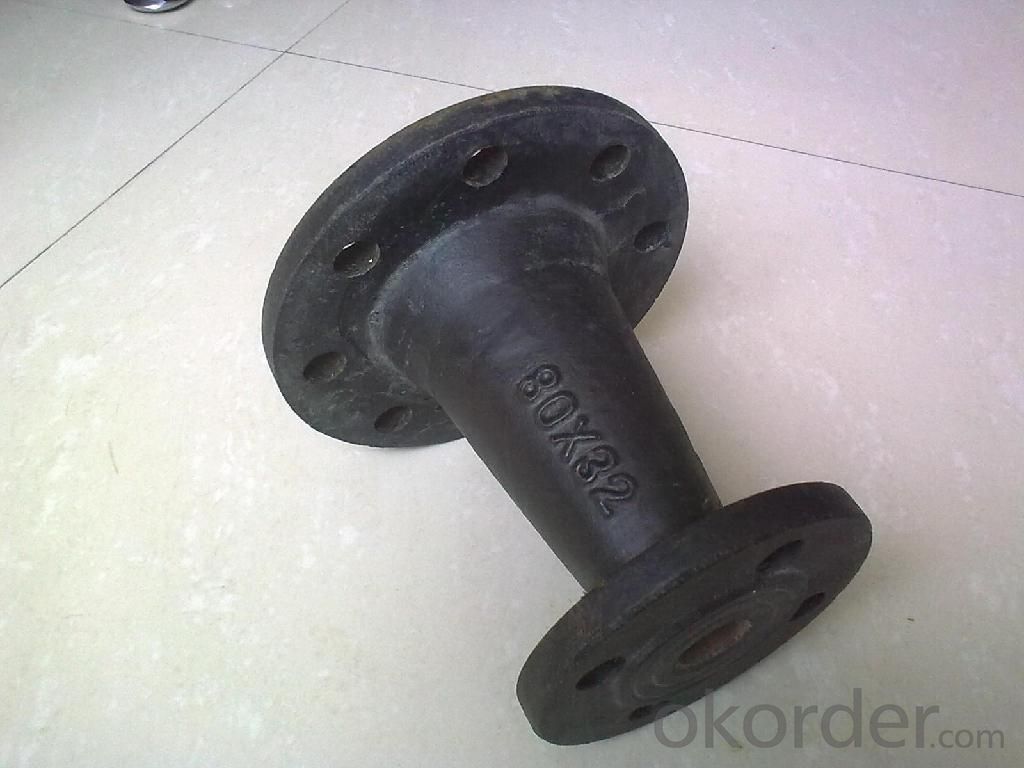
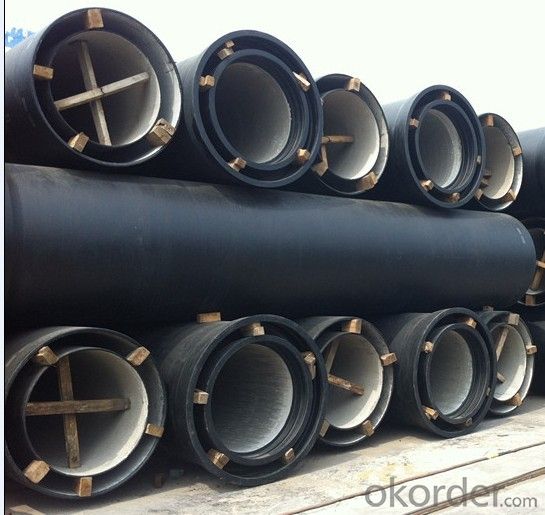
- Q: Can ductile iron pipes be used in potable water systems?
- Yes, ductile iron pipes can be used in potable water systems. Ductile iron is a suitable material for water distribution systems as it has excellent durability, strength, and corrosion resistance. It is commonly used in potable water systems due to its ability to withstand high water pressure and its long service life. Additionally, ductile iron pipes are also approved by various national and international standards for use in potable water applications.
- Q: Ductile cast iron can replace copper sleeve
- The tensile and compressive capacity of the ball milled cast iron is not as good as that of copper. The hardness of Rongchang graphite copper sheath can reach HB210
- Q: Are ductile iron pipes resistant to alkali attacks?
- Ductile iron pipes have been proven to be highly resistant to alkali attacks. The material used in ductile iron pipes, known as ductile cast iron, is formulated with specific chemical compositions that provide exceptional corrosion resistance. This resistance extends to alkali attacks, which are chemical reactions that occur when alkaline substances come into contact with metals or other materials. Ductile iron pipes have a dense and protective oxide film on their inner and outer surfaces, which acts as a barrier against chemical attacks. This oxide film forms naturally over time, and its composition and structure provide excellent resistance to alkali attacks. Additionally, ductile iron pipes are often coated with various protective layers, such as epoxy or zinc, to further enhance their resistance to corrosion and chemical reactions. It is important to note that while ductile iron pipes are highly resistant to alkali attacks, the severity and concentration of the alkali substances can still impact their overall performance. In extreme cases, very high concentrations of alkali substances or prolonged exposure to aggressive alkaline environments may eventually cause some damage to the protective layers of the pipes. However, under normal conditions and within acceptable parameters, ductile iron pipes are considered to have excellent resistance to alkali attacks.
- Q: Are ductile iron pipes suitable for fire protection systems?
- Yes, ductile iron pipes are suitable for fire protection systems. Ductile iron is a strong and durable material that can withstand high pressure and temperature fluctuations, making it ideal for fire protection systems that require reliable and long-lasting pipes. Additionally, ductile iron has excellent corrosion resistance, which helps to prevent the degradation of the pipes over time, ensuring the integrity of the fire protection system. The high tensile strength of ductile iron also provides added safety benefits as it can withstand the stress and strain that may occur during a fire event. Therefore, ductile iron pipes are a suitable and commonly used material for fire protection systems in various applications, including commercial buildings, industrial facilities, and residential areas.
- Q: How are ductile iron pipes manufactured?
- Ductile iron pipes are manufactured through a process known as centrifugal casting, which involves the use of a spinning mold. The process begins with the selection and preparation of high-quality ductile iron, which is a type of cast iron that contains small amounts of magnesium to enhance its strength and ductility. First, the ductile iron is melted in a furnace at extremely high temperatures. Once the molten iron reaches the desired temperature, it is poured into a spinning mold. The spinning mold is designed in the shape of a pipe, and it rotates at a high speed to distribute the molten iron evenly along its inner surface. As the mold spins, the molten iron cools and solidifies against the mold walls. This rapid cooling results in a fine-grained structure and enhances the mechanical properties of the pipe, such as its strength and durability. The spinning mold continues to rotate until the pipe has completely solidified, which typically takes a few minutes. After solidification, the pipe is removed from the mold, and excess material, known as the "skin," is removed. The skin is typically removed by machining or grinding to achieve the desired dimensions and surface finish. Next, the pipe undergoes heat treatment to further enhance its mechanical properties and reduce internal stresses. Once the heat treatment is completed, the pipe is thoroughly inspected for any defects or imperfections. This includes visual inspections, non-destructive testing methods, and pressure testing to ensure the pipe meets the required specifications and standards. If any defects are detected, the pipe may be repaired or rejected depending on the severity of the issue. Finally, the pipes are coated with a protective layer to prevent corrosion and enhance their longevity. This coating can be applied through various methods, such as cement mortar lining, epoxy coating, or zinc coating. Overall, the manufacturing process of ductile iron pipes involves melting the iron, centrifugal casting, cooling, skin removal, heat treatment, inspection, and coating. This process ensures the production of high-quality pipes that possess excellent strength, durability, and resistance to corrosion.
- Q: Method for joining cast iron pipes
- Cast iron pipe, cast cast pipe. Cast iron pipes are used for water supply, drainage and gas transmission lines. They include cast iron pipes and pipe fittings. Labor intensity is small. According to the casting method, it is divided into continuous cast iron pipe and centrifugal cast iron pipe, in which the centrifugal cast iron pipe is divided into sand mould and metal type two kinds. Divided into gray cast iron pipe and nodular cast iron pipe according to different material. According to the interface form, it is divided into flexible interface, flange interface, self anchored interface, rigid interface and so on. Among them, the flexible iron pipes rubber sealing ring; flange interface cast iron pipe flange fixed in the rubber pad, the flange gasket sealing; rigid interface cast iron pipe socket is large, straight pipe is inserted, sealed with cement, this technology has been basically eliminated
- Q: Are ductile iron pipes suitable for use in hydropower projects?
- Yes, ductile iron pipes are suitable for use in hydropower projects. Ductile iron pipes are known for their strength, durability, and resistance to corrosion, making them ideal for carrying water in hydropower projects. Additionally, their ability to withstand high pressure and adaptability to various ground conditions further supports their suitability for such projects.
- Q: A tube is used only in ductile iron pipes, isn't it?
- Compared with the PE pipe, from the installation time, ductile pipe PE pipe installation is simple and rapid, and after the installation of internal and external pressure bearing better tightness and corrosion resistance; from the point of view, ductile pipe sealing better after installation, but also can improve the corrosion resistance of corrosion protection through a variety of means; from the hydraulic performance, because ductile pipe specifications generally refers to the inner diameter of PE pipe diameter specifications generally refers to the same specifications, because under the condition of ductile pipe can achieve greater runoff; from the installation and maintenance cost, ductile pipe have more favorable price. The main components of ductile iron pipes are carbon, silicon, manganese, sulfur, phosphorus and magnesium. The inner wall of zinc spray, anti-corrosion materials such as cement mortar.
- Q: How are ductile iron pipes tested for quality assurance?
- To guarantee the quality and adherence to industry standards of ductile iron pipes, a variety of testing procedures are carried out. These tests evaluate both the raw materials and the finished products, aiming to ensure the pipes' durability, strength, and overall reliability. The first step involves analyzing the chemical composition of the raw materials used in the manufacturing process. This analysis verifies that the iron, carbon, and other elements fall within the specified range, as different compositions can impact the pipes' strength and resistance to corrosion. Next, mechanical tests assess the pipes' strength and ductility. Tensile tests determine properties like ultimate tensile strength, yield strength, and elongation, which help assess the pipes' ability to withstand external pressure and bending forces. Moreover, impact tests measure the pipe's ability to resist sudden loading or impact. By evaluating the energy absorbed by the pipes under high impact force, these tests ensure that the pipes can endure accidental impacts during installation or operation. Another pivotal test is the hydrostatic pressure test, which examines the pipes' capacity to withstand internal pressure. By subjecting the pipes to a specific pressure for a designated duration while filled with water, this test ensures their capability to handle expected operating pressures without any leakage or failure. Furthermore, dimensional and visual inspections are conducted to verify that the pipes meet the required specifications. These inspections involve checking the outer diameter, length, wall thickness, and overall appearance for any defects, such as cracks, voids, or irregularities. Lastly, corrosion resistance tests evaluate the pipes' ability to resist corrosion when exposed to different environments or fluids. These tests help determine the pipes' expected lifespan and their suitability for various applications. In conclusion, these quality assurance tests are vital in ensuring that ductile iron pipes adhere to the necessary standards and deliver dependable, long-lasting performance in diverse infrastructure projects.
- Q: Can ductile iron pipes be used for both water and sewer applications?
- Ductile iron pipes are versatile and can be utilized for water and sewer purposes. These pipes exhibit remarkable durability and exceptional corrosion resistance, rendering them appropriate for transporting both drinkable water and wastewater. Furthermore, they possess the ability to endure high pressure and resist external loads, making them a perfect fit for underground installations. Additionally, these pipes boast a lengthy lifespan and necessitate minimal upkeep, thereby offering a cost-effective option for water and sewer systems.
Send your message to us
Ductile Iron Pipe On Sale Made In China DN200
- Loading Port:
- Tianjin
- Payment Terms:
- TT or LC
- Min Order Qty:
- 1000 m
- Supply Capability:
- 10000 m/month
OKorder Service Pledge
OKorder Financial Service
Similar products
Hot products
Hot Searches
Related keywords
